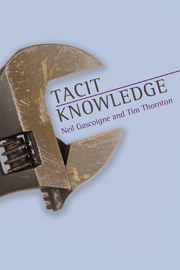6 - Tacit knowledge and language
Summary
INTRODUCTION
Drawing on two key slogans from Michael Polanyi and “regress arguments” for the priority of practical knowledge over theoretical knowledge (or practical knowledge-how over knowledge-that) put forward by Polanyi, Gilbert Ryle, Martin Heidegger and Ludwig Wittgenstein, we have argued that the idea of tacit knowledge should be thought of as context-dependent but conceptually structured practical or personal knowledge.
The stress on balancing conceptual structure with both context-dependence and practical knowledge addresses a potential worry that knowledge has to have a content. Tacit knowledge is knowledge. Thus, unlike accounts of context-dependent skilled coping, our account of tacit knowledge presupposes a rational subject. At the same time, unpacking the conceptual structure requires both context-dependent demonstratives and practical demonstration. It cannot be put into words alone. Tacit knowledge is tacit.
The equation of “personal” and “practical” flags the fact that such knowledge can only be articulated practically and from within. It requires not just a context, which would be sufficient for context-dependent spectator knowledge, but also a skilled agent both to perform the practical demonstration (in the role of the teacher) and also to have “eyes to see” the import of the demonstration (as the “learning-ready” pupil).
This chapter considers what might appear a surprising connection: a positive relation between tacit knowledge and language. It might seem surprising because we have approached what is tacit by a suitable contrast with what is “tellable” or what is explicit, and what can be codified in general (i.e. context-independent language) has been paradigmatic of the explicit.
- Type
- Chapter
- Information
- Tacit Knowledge , pp. 167 - 190Publisher: Acumen PublishingPrint publication year: 2013



